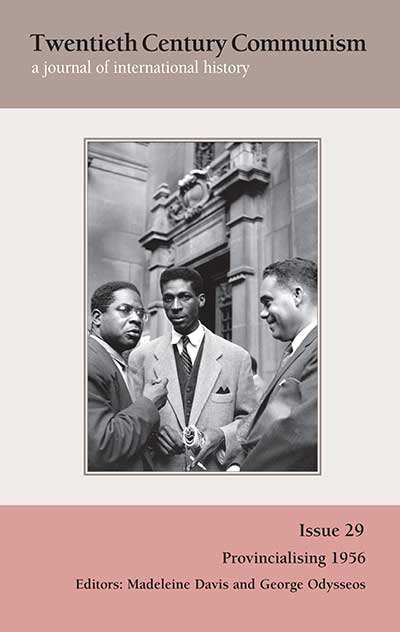
‘That crucial summer of 1956’? Stalinism, anti-imperialist strategies and the fragmentation of the international communist movement – a view from Cyprus, c. 1949-1960
Twentieth Century Communism - Print ISSN 1758-6437 - Online ISSN 2978-1329
Volume 2025 Number 29
‘That crucial summer of 1956’? Stalinism, anti-imperialist strategies and the fragmentation of the international communist movement – a view from Cyprus, c. 1949-1960
George Odysseos pages 40‑67
Abstract
This article explores the complicated impact of Stalinism’s political crisis and anti-imperialist politics on Cypriot communism in the 1950s. While the year 1956 has featured prominently in the historiography of western communist parties, the date hardly features in studies of Cypriot communism, nor in the history of the communist AKEL (Progressive Party of Working People). These latter studies have instead focused on AKEL’s stance towards the rightwing EOKA (National Organisation of Cypriot Fighters) campaign against British colonialism (1955-1959). Nevertheless, many of the issues that lent their weight to the significance of 1956 – such as the process of de-Stalinisation and question of party discipline, as well as the dilemmas opened up by the development of ‘national roads’ to socialism – played an important role in Cypriot communism during the period. AKEL, then, offers a case of a party connected to the ‘global 1956’ that did not centre on that particular calendar date. The article focuses on two prominent figures who were expelled from the party as a result of AKEL’s intra-party crisis of 1952; the young lawyer George Cacogiannis, and Evdoros Joannides, perhaps the party’s foremost propagandist resident in London. In discussing their writings and activities, the article reveals the global arena Cypriot communists operated within, highlighting the ways issues of international communism were adapted to Cypriot conditions and concerns, which revolved around effort to ‘internationalise’ the national issue. In doing so, it demonstrates that, for some parties, the resonance of the Suez Crisis outlasted the shock of the Soviet invasion of Hungary, and offered a framework for the ‘recontextualisation’ of the Soviet Union through the Non-Aligned Movement.
To cite this article
George Odysseos (2025) ‘That crucial summer of 1956’? Stalinism, anti-imperialist strategies and the fragmentation of the international communist movement – a view from Cyprus, c. 1949-1960, Twentieth Century Communism, 2025(29), 40-67
